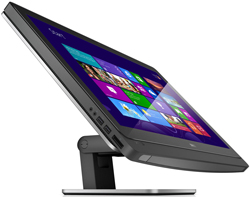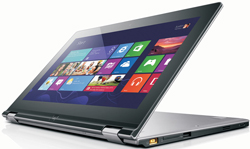News
Microsoft OEMs Share Surface's Limelight with Windows 8/RT Devices
- By Jeffrey Schwartz
- October 25, 2012
Microsoft's first-ever PC, the Surface RT hybrid computer-tablet system, is getting a lot of attention with Thursday's launch of Windows 8 and its tablet-only subset, Windows RT.
But the Surface RT, which goes on sale tonight at midnight, isn't the only game in town when it comes to Windows 8/RT devices. Key OEM partners Acer, ASUS, Dell, Hewlett-Packard, Lenovo, Samsung, Sony and Toshiba are among those launching or making available a new class of devices based on the most significant Windows revamp in more than two decades. A couple dozen will become available Friday in retail stores, the channel and online, and many more will ship in the coming weeks and months. Expect to see more systems launched in the first week of January at the Consumer Electronics Show in Las Vegas. (Related: Windows 8 Ultrabooks Gallery, Part 1 and Part 2.)
Most of the hardware suppliers are releasing a wide variety of systems, ranging from large desktops, all-in-one systems and high-end workstations, to various laptops and tablets. A handful of systems run only Windows RT, the Windows 8 variant that only runs Microsoft's new so-called Modern UI (which until recently was known as Metro), meaning they can't run traditional Windows apps -- only those developed for the new interface.
A number of the vendors launching new systems offered previews of their new offerings to the media Wednesday in advance of today's launch. Among them were ASUS, Dell and Lenovo.
"We're happy to see that our OEM partners are developing a great set of devices targeted for our business customers," said Irwin Visser, senior director for Windows commercial marketing of Microsoft's Windows business group, in an interview.
Visser downplayed any impact Microsoft's release of the Surface line might have on the fortunes of its existing PC partners, saying, as Microsoft has argued, that customers will have plenty of different models, form factors and price points to choose. While PC vendors are predictably displeased with Microsoft's decision to jump into the PC hardware market, Kirk Schell, vice president of computing products at Dell told reporters Wednesday that his company is offering a broad array of new PCs that will support Windows 8/RT. As such, he looked to put a positive spin on Microsoft's Surface when asked about it.
"I think surface was necessary to create buzz and also to get some application development ramped up," Schell said. "We think it's more than one device. For us, a device fits into an ecosystem but it's about more than that, it's about service, support and customer relationships. If you look at our direct sales force around the world, we have long standing relationships with our customers. Although the device is important, it's only part of our story."
Also, Schell added, "we believe people will want a variety of different form factors."

[Click on image for larger view.] |
| Dell XPS One |
Like many PC vendors, Dell showcased its new wares in a hotel suite in New York, not far from where today's launch will be held. Among them was Dell's competitive answer to the Surface RT, the XPS 10. Based on a dual-core Qualcomm Snapdragon S4 ARM-based processor, like the Surface RT it will start at $499 without a keyboard for a 32 GB system and $679 with a keyboard. A 64 GB version will cost $599 or $799 with a keyboard. "We're enabling it for bring your own device implementations," Dell's Schell said.
Dell showcased more than a dozen new systems that will run Windows 8 including the $1,399.99 XPS One, a 27-inch all-in-one touch-based unit; the XPS 12, a new Ultrabook priced at $1,199.99 equipped with an Intel Core i5 processor (also available with an i7), 4 GBs of RAM and a 128-GB solid state drive (SSD); the 10-inch Latitude 10 Tablet, aimed at enterprises and designed for compatibility with existing systems management suites and like a number of its commercial offerings, support for Dell's Data Protection Encryption technology. It offers 18 hours of battery life and an optional dock.
The Dell Latitude 643u also looks to satisfy the enterprise litmus test. Dell touted the Ultrabook's secure system and support for the U.S. Military's MIL-STD 810G standard. It starts at $899.

[Click on image for larger view.] |
| Lenovo IdeaPad Yoga 11 |
Lenovo also demonstrated six systems. Its Windows RT-based entry is the IdeaPad Yoga 11, sporting an 11.6-inch display and powered by an NVIDIA Tegra 3 (T30) ARM-based processor. Lenovo touted its 13 hours of battery life, though there's a weight penalty for that extra power: it comes in at 2.8 pounds. Lenovo described the Yoga 11 as a multi-mode laptop PC. The attached keyboard is dual-hinged, enabling 360-degree rotation and can be used in four different mode: laptop, tablet, stand and tent. It's priced at $799 for a 64 GB drive.
For enterprise customers, Lenovo is releasing the ThinkPad Tablet 2. This Windows 8-based machine comes with an Intel Atom processor, weights 1.3 pounds and is only a third of an inch think. It sports 10 hours of battery life and is one of the few units that will offer 4G/LTE support on the AT&T network. The base price for a 32 GB system with 1 GB of RAM is $649.
ASUS demonstrated a handful of systems including its Windows RT entry, the Vivo Tab RT, which starts at $599. Equipped with a NVIDIA Tegra 3 quad-core processor, it will also be available with optional 4G/LTE connectivity from AT&T. The company is offering an optional detachable keyboard for $169, though it is issuing rebates for the full amount of the keyboard, a spokeswoman said.
Like Lenovo and Dell, ASUS demonstrated a wide array of form factors, including the Taichi Ultrabook, which features dual 11.6-inch displays, one on top and one inside. Available with either Core i5 or i7 processors, 4GB of RAM and 128/356 GBB SSDs, pricing ranges from $1,299 to $1,599. The company also launched the VivoBook Series, available with 11.6 to 14-inch displays and incorporating ASUS's Smart Gesture Technology and offer 32 GB of Web storage for three years.
More Launch Coverage:
About the Author
Jeffrey Schwartz is editor of Redmond magazine and also covers cloud computing for Virtualization Review's Cloud Report. In addition, he writes the Channeling the Cloud column for Redmond Channel Partner. Follow him on Twitter @JeffreySchwartz.